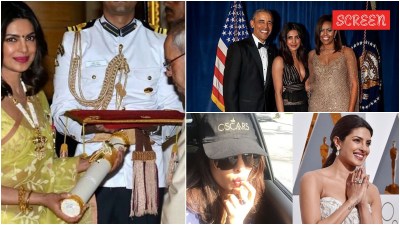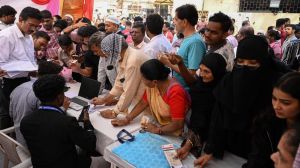Bare necessities
A few months ago, the US air force had, apparently, deployed a hundred aircraft to bomb H3 or Al-Walid, the Iraqi air base 50 km west of Rut...

A few months ago, the US air force had, apparently, deployed a hundred aircraft to bomb H3 or Al-Walid, the Iraqi air base 50 km west of Rutbah on the Jordan border. That was the very place where we spent two years during the period of the Iran-Iraq war.
When we landed in Baghdad, it was a pleasant sight. It was difficult to imagine, looking at the capital, that the country had been in a prolonged war for nearly eight years. Al-Walid was another story altogether. It was a bare desert and the air force station consisted of a symmetrical row of identical prefabricated houses, some 60-odd. We were a group of 16 Indian families, not counting the seven families already there. This made quite a large community but we lived in houses spread all over the station and had, generally, Iraqis for neighbours.
Having spent many years in small flying stations in India, we knew what they were all about. But H3 was very different. We missed the tambola, parties, the cinema hall and the small shops. Besides the two rows of houses at H3, there was one little shack, which provided us some vegetables, some butter and the more than welcome khubz, tandoori roti, Iraqi style. After all, after cooking and cleaning, no one had the energy to make chapattis!
Our life here centred on the house. Here I was memsaab, cook and cleaner. I learnt to juggle cooking, washing, teaching the kids and socialising, so that I would still have time to breathe! Among our Iraqi neighbours, we found women favoured black. I noticed one particular lady pushing her child8217;s pram, on my daily walk, with her head covered in a black scarf. I asked her why she never wore any other colour. She said that she had lost close relatives, one after the other in the long war. For each one of them she was supposed to mourn for a year. She had been in black for the last six years!
The high point of our stay in H3 was the monthly ijazeh, the short break of two or three days we got in Baghdad. We would be taken there in a military transport aircraft. Abdul, our driver had been driving Indians around for years. He knew a smattering of Hindi and he helped us improve our Arabic. With him, we learnt to scour the various orizdis 8212;Iraqi malls8212;and even manage an occasional trip to the souk, the great open market where one could get fabric from all the friendly countries, including India.
Once, we got a message from the air attache that unless we had very urgent work we should avoid coming to Baghdad as Iranian missiles were landing all over the city. Many were intimidated by this. Not us. As my husband pointed out, if a missile, which had our names, arrives, it would get us even in H38212; which was considered very safe. Clearly the Iraqis at H3, who met with US missiles this time, were not as lucky as we were.
- 01
- 02
- 03
- 04
- 05































